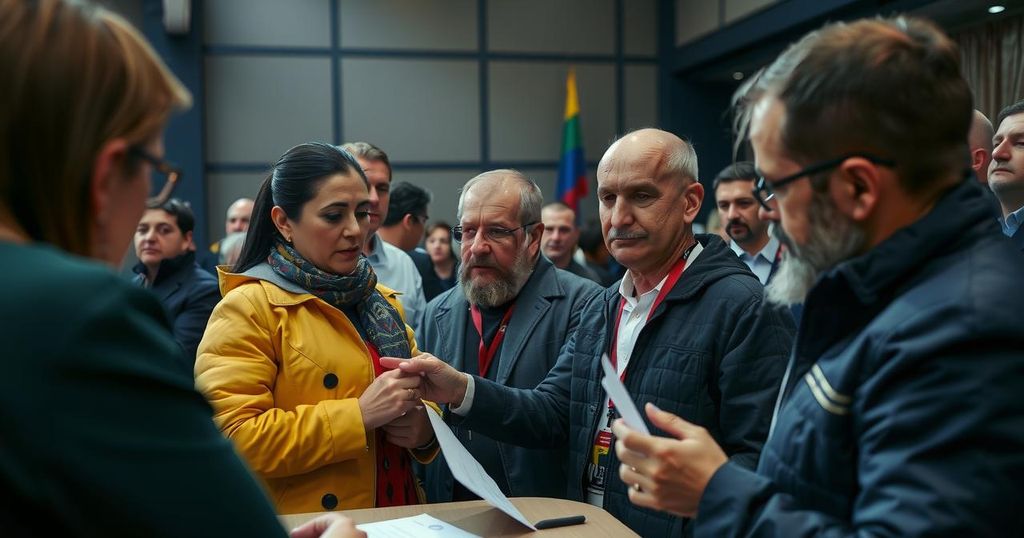Moldova’s Presidential Runoff: A Battle Between EU Integration and Russian Influence

Moldovans will vote in a runoff on Sunday between pro-EU incumbent Maia Sandu and pro-Russia challenger Alexandr Stoianoglo. Sandu, facing allegations of Russian interference, aims to maintain EU ties amidst growing geopolitical tensions, while Stoianoglo advocates for improved relations with Moscow, complicating Moldova’s path to membership in the European Union.
On Sunday, the Moldovan electorate will engage in a decisive runoff election to determine the next president, between the incumbent pro-European Union leader Maia Sandu and her challenger Alexandr Stoianoglo from the pro-Russian Socialist party. In the initial round of voting, Sandu garnered 42% of the votes, yet she now faces a stiff challenge as Stoianoglo’s coalition aims to consolidate its support among the populace. The backdrop to this election is Moldova’s recent referendum in which a narrow majority indicated its intention to seek EU membership. Historically, Moldova has fluctuated between pro-Western and pro-Russian allegiances since the dissolution of the Soviet Union. Under President Sandu, a former World Bank adviser, there has been a marked acceleration in efforts to reduce dependence on Russia, especially amid the regional instability caused by the war in Ukraine. Allegations of Russian involvement have marred both the referendum and the first electoral round, with claims of vote-buying schemes allegedly orchestrated by Moscow. Sandu has publicly criticized Russia’s interference, stating, “Moldova has faced an unprecedented assault on our country’s freedom and democracy, both today and in recent months.” Her administration has indicated that extensive resources were deployed to counteract what they term a pervasive Kremlin-backed vote-buying operation. Olga Roșca, a foreign policy adviser to Sandu, emphasized the urgency, saying, “Every available resource has been mobilized—from law enforcement to public service announcements in trolleybuses and supermarkets.” In contrast, Stoianoglo has dismissed accusations of acting on behalf of Russia, claiming to support EU accession while calling the recent referendum a “parody.” He advocates for improved relations with Moscow, stating that the perceived interference is “highly exaggerated.” The territorial security concerns associated with Russia are exacerbated by the presence of Russian troops in Transnistria, a breakaway region with pro-Russian separatist sentiments. This situation continues to cast a shadow over Moldova’s aspirations for EU integration, particularly given the context of electoral developments in Georgia, another former Soviet state. As the runoff approaches, the political landscape remains charged and fraught, with Moldova’s geopolitical orientation hanging in the balance. The electoral narrative is also overshadowed by the recent parliamentary election in Georgia, where the ruling party, widely regarded as aligning with Moscow, faced allegations of election fraud.
Moldova, a small Eastern European country with a population of approximately 3 million, has historically oscillated between pro-Western and pro-Russian stances since gaining independence after the Soviet Union’s dissolution. The upcoming presidential runoff pits incumbent Maia Sandu, who champions EU integration, against Alexandr Stoianoglo, who represents Russian interests. Recently, Moldova’s electorate demonstrated a preference for EU membership in a closely contested referendum. However, election integrity is under scrutiny due to claims of Russian interference and vote-buying schemes, reflecting the broader regional contest between Western and Russian influences in ex-Soviet states.
The impending presidential runoff in Moldova epitomizes the ongoing struggle between pro-European and pro-Russian factions within the country. Maia Sandu’s administration seeks to solidify EU ties and counteract Russian influence, while Alexandr Stoianoglo’s campaign highlights the complex interplay of local and external interests. As this narrative unfolds, the international community closely monitors electoral integrity and the implications for Moldova’s future alignment in the geopolitical landscape.
Original Source: www.theguardian.com








